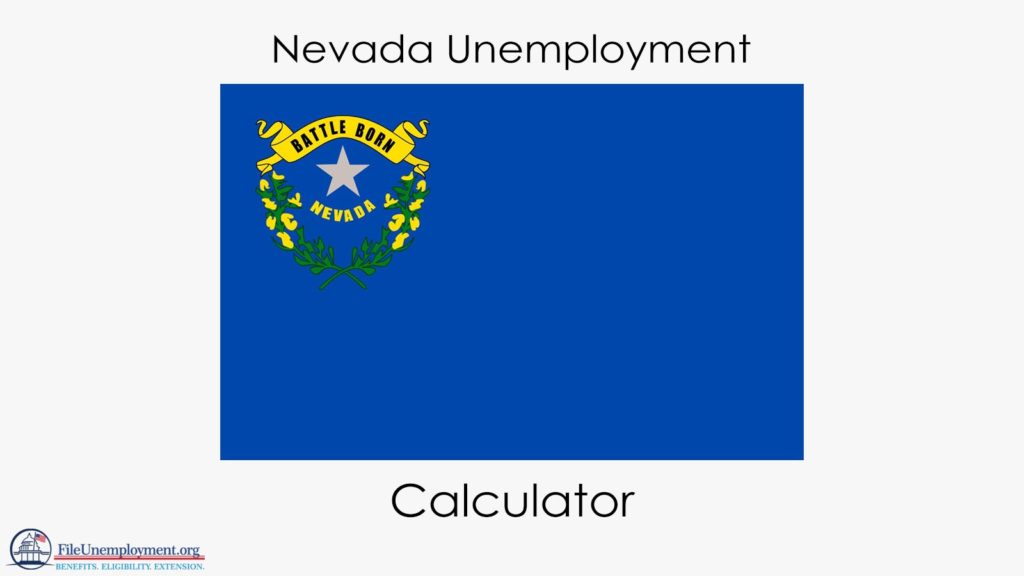
Calculate your projected benefits by entering your quarterly wages.
We created this calculator to help you estimate your weekly Nevada unemployment benefits. This is not a guarantee of UI benefits.
Nevada Unemployment Benefits Calculator
The Nevada unemployment calculator helps individuals who are currently unemployed calculate how much their weekly benefit amount might be. It’s important to understand that this tool only provides an estimate of Nevada UI benefits—it is not a guarantee of compensation.
How are Nevada unemployment benefits calculated?
When you apply for unemployment benefits, the money you receive each week is called your “weekly benefit amount.” This amount is calculated by taking 4% of the earnings you made in your highest earning quarter.
The maximum weekly benefit amount is around $483. You cannot receive more than this, no matter how much you earned. The minimum weekly benefit amount is $16.
For example, if your highest earning quarter wages were $12,000, your benefit amount would be $480. If your highest earning quarter wages were $7,550, your weekly benefit amount would be $302.
How many weeks do I get Nevada unemployment benefits
When you apply for unemployment benefits, your claim is valid for one year starting from the date you filed it. You can only receive unemployment compensation for a maximum of 26 weeks during a one-year period.
What is a base period?
Unemployment eligibility is determined by how much money you earned during a specific period of time called the “base period.” This period is made up of the first four out of the last five completed calendar quarters before you applied for benefits.
Your weekly benefit amount is based on how much you earned during your highest quarter. Essentially, the more money you made during that period, the higher your weekly benefits will be, up to a certain maximum amount.
Are extended benefits available?
There are currently no extended benefits available in Nevada. Typically, extended benefits are only provided when the unemployment rate reaches a certain level. In some cases, they may also be available following a natural disaster or during periods of significant economic insecurity (such as a pandemic).
Can I work part time and receive benefits?
Yes, you can work as a part-time employee and receive Nevada unemployment insurance benefits. However, it is an eligibility requirement that you must search for work with a full-time employer and report any wage earned during the week. Once your gross weekly earnings exceed your weekly benefit amount by 150%, you will be considered re-employed and no longer eligible to receive benefits.
How do I get paid?
Nevada issues all unemployment payments through the Way2Go prepaid debit MasterCard. This card is valid for five years after filing your first unemployment claim. If you do not already have one, you should receive a card within 7 to 10 days after filing an initial application.
If you prefer to have the money deposited into a checking or savings account, you can log into your Way2Go card account and opt for a direct deposit by providing your account number and bank routing number.
If you do not want to receive your UI benefits through the Way2Go prepaid debit card, you can call your local UI claims center and request that your benefits be sent via check in the mail.
What if I filed my weekly claim but didn’t receive payment?
Your UI benefits might not be available yet because of problems with your eligibility. You can look up the status of your claim online by logging into the claimant portal at ui.nv.gov, or you can call your local UI claims center.
Are unemployment benefits taxable income?
Yes. You have to pay a federal income tax on any compensation you receive from the unemployment benefit program. You can opt to have the state of Nevada withhold 10% of your weekly benefit amount and send it to the IRS on your behalf. You do not have to pay state taxes on Nevada unemployment benefits because Nevada does not have a state income tax.
In January, the Nevada Department of Employment, Training and Rehabilitation will send you IRS Form 1099-G, which outlines how much money you received from the unemployment insurance program.
It is your responsibility to ensure you are accurately reporting and paying the correct amount of taxes to the IRS.




